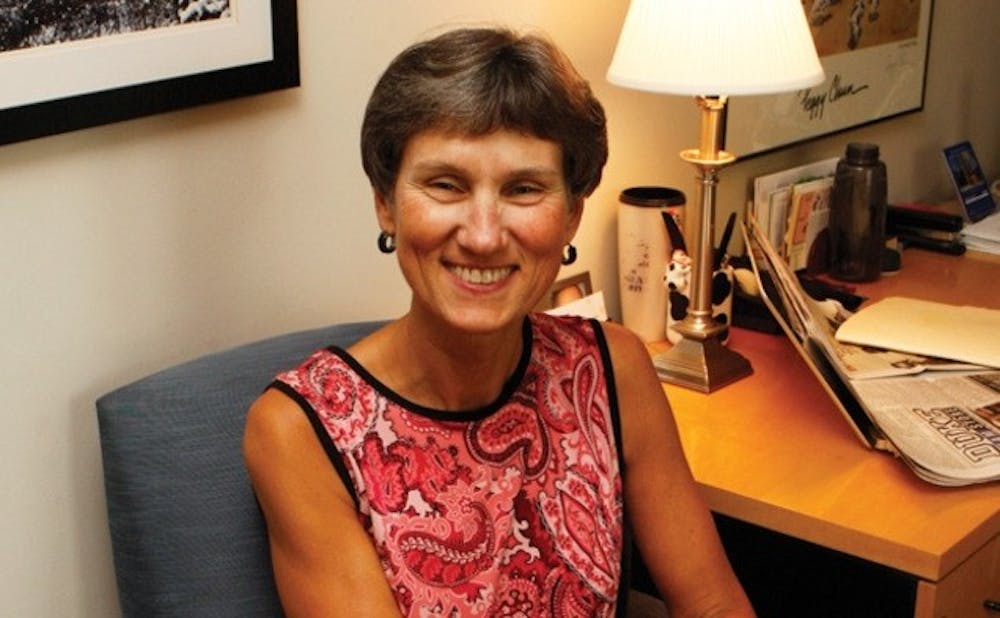Hearings for an ongoing civil suit filed by sophomore Ciaran McKenna against the University continued Tuesday with testimony by two administrators from student affairs.
Tim Bounds, senior director for strategic operations, and Sue Wasiolek, associate vice president for student affairs and dean of students, testified on the procedures for handling sexual misconduct allegations at Duke.
McKenna—a men's soccer player—was suspended for six semesters in January after being found responsible for sexual assault by the Office of Student Conduct. He is currently suing Duke on the grounds of a breach of contract, common-law fairness violations and negligence.
A three-person panel, convened in July 2016 by the Office of Student Conduct, found unanimously that McKenna was responsible for violating sexual misconduct policy because the victim had not verbally consented. However, the first panel was not unanimously convinced that the alleged victim, who is also a student, said “no” to the sexual encounter—although she claimed that she had.
McKenna appealed the decision, and the appeals panel found that there was procedural error in the first panel, which did not use the appropriate "reasonable person" standard to decide the case. The issue was then returned to the Office of Student Conduct. A second panel, convened in November 2016, found that the alleged victim had not given consent, and that she had also explicitly denied it.
At that point, McKenna appealed to a second appeals panel, which decided not to overturn the decision. McKenna was then suspended in January.
Jay Ferguson and Emilia Beskind, lawyers for McKenna, questioned Bounds—who chaired both appeals panels—about his role in the appeals process. Their inquiries focused on grounds for students to appeal a decision. As late as last May, the student conduct guide gave three reasons for an appeal: a procedural error, new information or that the initial finding had no plausible basis.
(The current guide only lists two reasons for an appeal—procedural error and new information).
Bounds said that when the first appellate board reviewed the case, they found a procedural error in that the initial panel “did not address the reasonable person standard” in their findings. Beskind asked Bounds if he considered reviewing whether the finding had a plausible basis in the record, instead of just focusing on the procedural error.
“We could not go forward to address the plausible basis standard because from the letter, it wasn’t convincing they had used the reasonable person standard,” Bounds said.
Beskind argued that the appeals board remanding the case with instructions to use the reasonable person standard would not have changed any of the testimony in the first panel. According to her argument, this meant that the original panel's finding—which was less harsh than that of the second panel—could still have been valid.
She then asked if Bounds sent the case back to the Office of Student Conduct with instructions to convene an entirely new panel to evaluate that case. Bounds said he did not and confirmed that the Office of Student Conduct is the one that has the power to arrange a new hearing.
McKenna’s lawyers then questioned Wasiolek about OSC procedures and about conversations she had with OSC Director Stephen Bryan regarding McKenna’s situation. Ferguson asked if Wasiolek condoned all of Bryan’s actions, to which Wasiolek said yes.
Ferguson also asked about the formation of a new panel to evaluate McKenna’s case. Wasiolek said that a member of the original panel could not have participated again because she did not work for Duke any longer. Jerrica Washington, a student involvement program coordinator, is no longer listed on the official Duke Directory but was on the initial panel. Ferguson asked if the member was still in the country and Wasiolek said yes, but that she would not be eligible to sit on a hearing panel at that point.
Of particular importance to Ferguson was McKenna's six-semester suspension. Last week, McKenna’s lawyers filed a preliminary injunction in order to reinstate him at the University until the end of the case.
Wasiolek said that Duke is opposing the preliminary injunction because McKenna had been afforded all the processes and procedures available to him.
"To basically have the rug pulled out from under [this policy] basically means that a lot of this is for naught and that there’s no real teeth in our process,” Wasiolek said.
Judge Orlando Hudson will continue to hear arguments Wednesday.
Get The Chronicle straight to your inbox
Sign up for our weekly newsletter. Cancel at any time.

